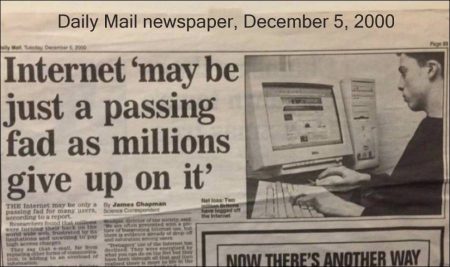
There are also those who think that the Metaverse is a passing fad. The British Daily Mail newspaper reported on December 5, 2000 with the headline “Internet ‘may be just passing fad as millions give up on it’”.
Four conditions are required for an innovation or invention to find value in real life. Responding to human needs, promising a commercial return in terms of business results, being viable and having the technology to realize this. Since Metaverse has all these four features, it is certain that it will have a permanent place in our lives for a period that we cannot foresee for now. In the meantime, it is certain that there will be many stumbles and disappointments. For example, it would be childish to think that cheap land closure attempts by those who want to turn the corner will yield meaningful results.
If we leave aside the contribution Metaverse will provide to commercial organizations in the fields of retail, luxury consumption, sports and entertainment and the new business horizons it will open for them, the difference it will create in the field of education may be revolutionary in this field. Unfortunately, past experiences show that technological developments are being used primarily in the destructive field.
Metaverse is a modified version of the real world. A three-dimensional virtual world. A cyberspace that offers synthetic hypothetical life to those who enter it. The first example in this direction is quite old. Caprica, which was produced in 1992, was about the meeting of two families belonging to different socio-economic classes with their lost children and told that “tears have no color or class”. In fact, the metaverse is not a very original development for those who are in adolescence or have just left this importance behind. Because they were experiencing the life that Metaverse promised to offer in the games they played.
The important difference of Metaverse is that it allows virtual realities to interact with each other. A person can pass through one door to another metaverse universe with what he or she has in the metaverse universe. It is possible for him to transform material assets over the currency of the universe he enters, just as a person who goes to a foreign country does.
In our previous articles, we wrote that this world is an extremely busy environment for men and is not very attractive for women. For companies to make women feel comfortable; He is working on measures such as silence and safe distance. However, these studies are still far from giving the expected results.
erious problem for children
At the moment, the most important problem Metaverse will create is about children. Some virtual apps are inherently dangerous. In a virtual reality environment, where a reporter from the BBC enters with the identity of a 13-year-old girl; She reported that she was the subject of sexual material, racial slurs and threats of rape. A spokesperson for the Foundation for the Protection of Children said she was shocked and appalled by the outcome. Andy Burrows, responsible for child safety and policy, described the current state of Metaverse as a “combination of toxic risk” for children.
In a research conducted by the BBC, it is possible to witness the sex performed by avatars and access sexual toys and condoms in the virtual reality rooms offered by the apps deemed suitable for the age of 13. There are pole dance and strip tease groups as well as innocent stops like McDonalds in VRChat, which is not made by Facebook, but anyone who is a Facebook member can join regardless of age.
In these environments, children and adults coexist, and unspeakable things happen with avatars approaching children. In short, children in this realm are totally open to experiences that are inappropriate and harmful to them. All these developments show that technology companies have not learned anything from the first generation social media experience and continue to work without any security concerns.
Conclusion
Distraction from reality carries a great risk for those who are already far from reality. Metaverse will be such a pleasant world of pleasure that ordinary people who consider themselves normal will not want to return to real life. As the results of this freedom, which will come with irresponsibility in a sense, are seen over time, it is understood that contrary to the first impression it creates, it will lead to unexpected results and the workload of mental health professionals will increase.
Most of the technological tools that Silicon Valley has pioneered are not driven by human demands. While these inventions were in the idea stage, ordinary people asked, “Where will I use them…? What good will that do…?” is met with questions. After a while, people ask themselves, “How do I live without them?” becomes a part of daily life enough to ask the question. Maybe that’s why these vehicles are called “heroic devices”.
If expected, different play, entertainment, education, communication and relationship models will emerge, and most importantly, new behavior patterns will emerge with them. There is no manual yet on how to manage them. Perhaps this will be the fun and exciting side of the potentially dangerous journey we embark on.
Commercial life will gain a versatile and effective new medium, different areas of expertise for each feature on the platform and coaches who try to convince us that you cannot be successful without them. However, when we evaluate the above findings, we see that besides the fancy promises of a digital technology company, we are ready to launch a product that is likely to have a devastating potential on public health without adequate scientific preparation about its risks.
Hits: 69


